A homeless person in New York City sleeps among belongings Aug. 31. (CNS/Reuters/Mike Segar)
Editor's note: This year, Global Sisters Report published a special series, A Place to Call Home, focused on women religious helping people who are homeless or lack adequate shelter. The series examined how homelessness and a lack of affordable housing affect teens and young adults, families, migrants, the elderly and those displaced by natural disasters and climate change in stories from Kenya, India, Vietnam, Ireland, Puerto Rico, the Philippines, the United States and elsewhere. This is the final story in the series. Read all of the stories.
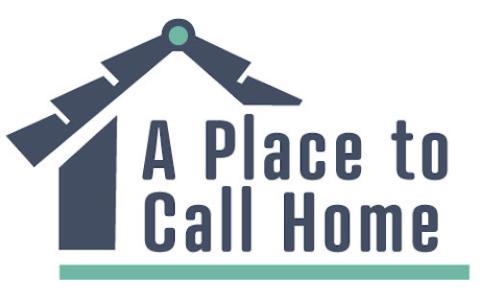
(GSR/Toni-Ann Ortiz)
Grand Valley Catholic Outreach recently completed a handsome new 34-unit apartment building for youth experiencing homelessness in Grand Junction, Colorado.
Benedictine Sr. Karen Bland, the agency's executive director, is justifiably proud of the new facility, meant for people ages 18 to 24 and intended to ease a growing homelessness problem on Colorado's Western Slope. The area, known for its rugged mountains, swift running rivers and windswept valleys, is experiencing growing population pressures in cities like Grand Junction, where about 60,000 people live.
But Bland said housing is only one solution to the problem of homelessness. She said homelessness is an immensely complex issue, and each person's circumstances are so unique that the only way to solve the problem is, essentially, by doing so one person at a time.
"Yes, they need food, clothing and housing, but then they need resources," Bland told Global Sisters Report, citing the importance of education, job training, addiction treatment, mental health treatment or a host of other issues people made poor can and do face.
"You can have the same situation in one locality and need very different resources somewhere else," she said. "What are the circumstances? What are the resources there?"
In a year that saw a global health pandemic, an international economic downturn and, at the United Nations, a new focus on homelessness, that respect for particular situations, resources and, ultimately, solutions is a cornerstone for solving the dilemma of homelessness, advocates say.
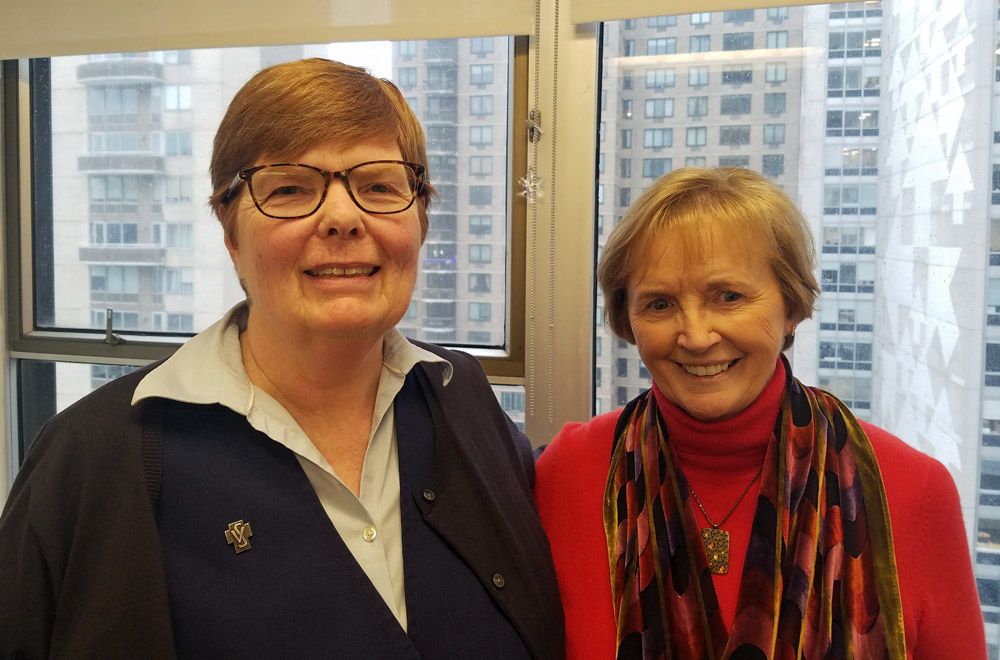
Sr. Margaret O'Dwyer, left, and Sr. Jean Quinn, co-chairs of the nongovernmental organization Working Group to End Homelessness, an advisory group of religious congregations and other organizations. (GSR photo/Chris Herlinger)
Elizabeth Madden, who is Irish and last experienced homelessness in Ireland 16 years ago, agreed, saying there cannot be an overall singular solution to homelessness because homelessness takes different forms.
"Similar to addiction, or mental health, homelessness is a cause of something," said Madden, who participated in the United Nations' first meetings on the topic of homelessness in February. "Each individual's story and recovery from homelessness will be different."
Respect for difference and individual experience is a must, said Sr. Margaret O'Dwyer, one of two representatives of the Company of the Daughters of Charity at the United Nations, and Daughter of Wisdom Sr. Jean Quinn, executive director of UNANIMA International, a U.N.-based coalition of Catholic congregations focused on concerns of women, children, migrants and the environment.
The two women are the co-chairs of the nongovernmental organization Working Group to End Homelessness, an advisory group of religious congregations and other organizations that was highly visible during the February United Nations meetings, held by the U.N.'s Commission for Social Development, one of the U.N.'s principal bodies dealing with development issues.
Quinn, who founded and headed the Irish agency Sophia Housing before becoming UNANIMA's executive director in 2017, said in an interview that any solution to homelessness must involve housing. But housing by itself cannot be a solution unless it is "housing with support," she said.
Echoing the concerns of Bland in Colorado, Quinn said those experiencing homelessness need services to help them overcome the attendant challenges of their lives, whether it be domestic violence, addiction or lack of job skills. She calls it "wraparound" support.
O'Dwyer agreed.
"You need a building, but you also need those support services," she said. "People need food, children need to be educated. It's multifaceted."
Madden's experience bears out that wisdom.
"The reasons why I ended up homeless varied at different points in my life," she said. "Once, I was escaping a domestic violence relationship, but ended up displaced in a treatment center for addiction. Addiction wasn't my problem at that point, but I had nowhere else to go, and it was safe."
Advertisement
A key factor in her leaving homelessness was in finding supported housing in which a social worker helped her through problems "until I got to a place in my life where I felt independent enough to take control of my own life." Such support came through Sophia Housing.
Supported housing may not be "an overall solution" for all people at all times, Madden said, but "it is a solution," though one that requires time, finances and resources.
The need for different types of support for those experiencing homelessness point to a basic fact, said Mercy Sr. Eileen Boffa in Bridgeport, Connecticut.
"It doesn't sound nice, but it's just about money. We need lots and lots of money," she said.
She runs a large furniture drive in Bridgeport for those who recently moved from living on the streets into apartments but are unable to fill them. She also leads spiritual retreats for people experiencing homelessness.
And from her vantage point, "if the United States is really serious" about fixing poverty and homelessness, the government would invest in public affordable housing, mental illness and substance abuse problems, to name a few.
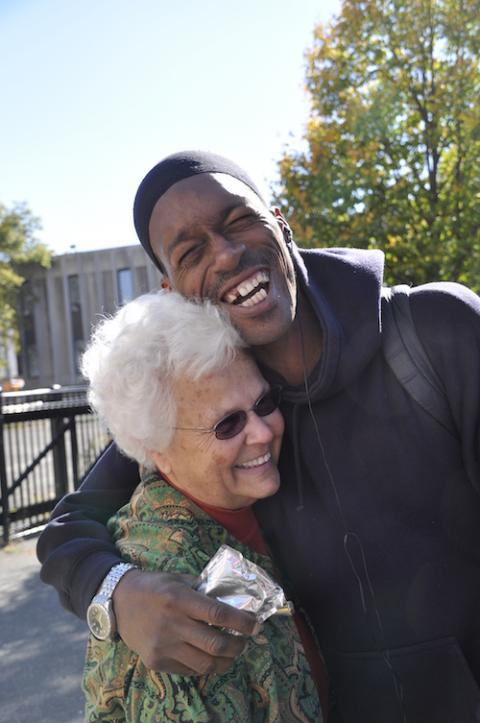
Mercy Sr. Eileen Boffa with a friend she met through her street ministry (Provided photo)
Not only are there not enough places where the housing-insecure can live, Boffa said, but the places that are available to them are often overpriced "ratholes," with tenants paying $700 to $800 per month for a single room in a roach-infested apartment with roommates.
If the government were to own properties for this group of people, it would eliminate the "slum landlords" who sometimes don't live in the same state as their tenants, rarely fixing what's broken while charging too much for rent, Boffa said.
"The folks would pay 30% of their income — the whole thing, you keep all those rules — but we have to get rid of slum landlords," she said. "And the only way I can think of that is if the government created enough property for people to live in nice, dignified housing."
That requires political change and is made all the more daunting by the challenges of the coronavirus pandemic, which has highlighted the need to tackle longstanding social problems like homelessness.
Mark McGreevy, who heads the U.K.-based nongovernmental organization Depaul International, which focuses on homelessness, agreed with Quinn, O'Dwyer and others that housing alone is not a singular solution. But in the United Kingdom, he said, the COVID-19 response proved that street homelessness can be nearly ended.
He said at the onset of the pandemic in the United Kingdom, more than 90% of those experiencing street homelessness — referred to in the United Kingdom as "street sleepers" — were moved "mainly into hotels within three weeks," and the British government is now focused on long-term solutions.
"It isn't the end of homelessness," McGreevy told GSR in an email, "but it shows what can be done. All it takes is political will, good quality accommodation and the right support services in place to respond to individual need. If we can build on the learning that this is how we should always treat homeless and vulnerable people, then I think we can make progress."
Experiences like Madden's, Quinn said, are proof that that homelessness is not a permanent condition.
"Sometimes people think that homelessness is a life. It's not," she said. "It's only a part of some people's journey."
Sisters whose ministries focus on housing and homelessness say progress is possible, but it must always be mindful of local experiences and dynamics. And in every place, there are complexities and challenges.
A need to affirm dignity for those experiencing homelessness
Residents who stay in the Home of the Good Shepherd, a transition home for recovering addicts in San Juan, the capital of the U.S. territory of Puerto Rico, receive a number of benefits during their stay, including job training and treatments.
But Sr. Rosemarie González says that can be a disadvantage when someone is ready to leave the home.
When González, a School Sister of Notre Dame who up until recently was the director of the transition home, asked the residents what they think would keep them off the streets, they emphasized community and family.
"If that's a good experience, using drugs or leaving the home will be minimal because they'll feel accepted in a group," she said.
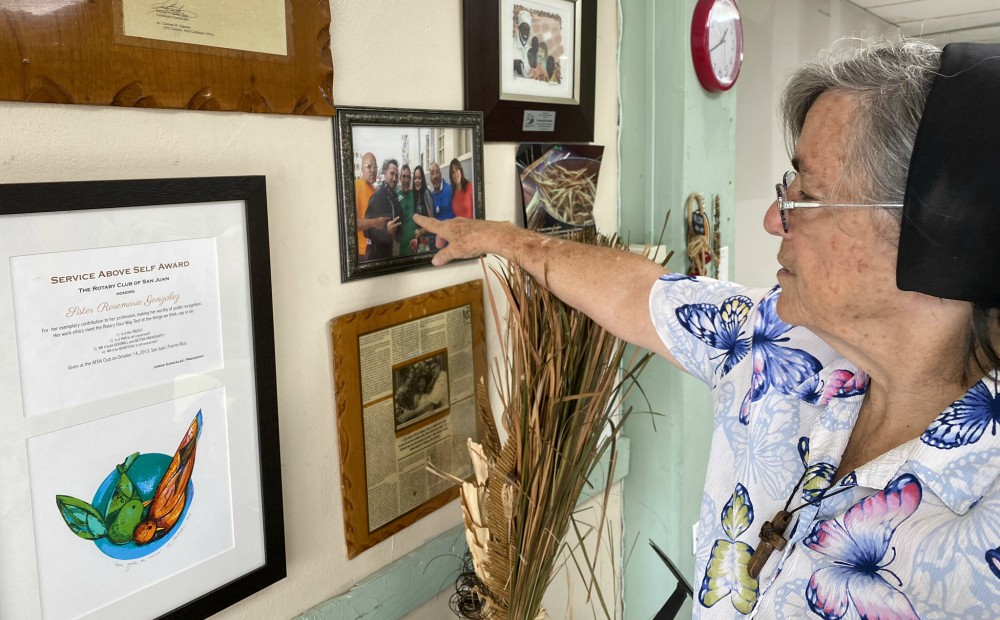
The lobby of the Home of the Good Shepherd in San Juan, Puerto Rico, has a gallery wall with framed articles featuring the home, as well as group photos of residents. Here, Sr. Rosemarie González shares memories of a group of people, some of whom are now deceased, who started a business together. (GSR photo / Soli Salgado)
They should also be kept busy, González said, noting that in the area, there's very little to do other than go to the beach. Residents said it would be helpful to have recreational activities such as sports or volunteering and support groups to keep them engaged socially, perhaps with a motivating leader in charge, to help keep them oriented. They also mentioned that it would be helpful for the social workers in Puerto Rico to conduct follow-ups by visiting their usual spot in the streets rather than expecting the individual experiencing homelessness to go to the offices for their appointments.
"They feel the government should loosen up on the bureaucracy of obtaining permanent housing — all the documents, all the inspections, everything that takes so long or makes it practically impossible or very hard for someone, especially if they're a person who needs help," González said.
González said the U.S. Department of Housing and Urban Development has designed its affordable housing program "almost exclusively" for the chronically homeless, and those about to transition out of Home of the Good Shepherd don't qualify for housing vouchers that subsidize rent.
"If that person wanted to get a voucher, they'd have to go the streets and be in the cycle all over again," she said. "That type of policy I don't understand, and I think it does more harm than good."
In Vietnam, St. Paul de Chartres Sr. Léonard Huynh Thi An runs the Elderly Loving Home in Da Nang, which offers free accommodation and care to 30 women between the ages of 70 and 100. She said more government intervention is needed in order to solve homelessness among elderly people who have been abandoned on the streets.
This is especially needed now with an increase in homelessness caused by the pandemic's economic downturn, she said.
Though An has support among donors, benefactors and volunteers, she said she sees a need for more facilities and plans to get building permits from the government to build additional facilities.
An, who has worked with abandoned elderly for years, said those who are admitted into her facility "feel safe and loved, enjoy their personal freedom, have human dignity respected and especially want to stay at the home until death."
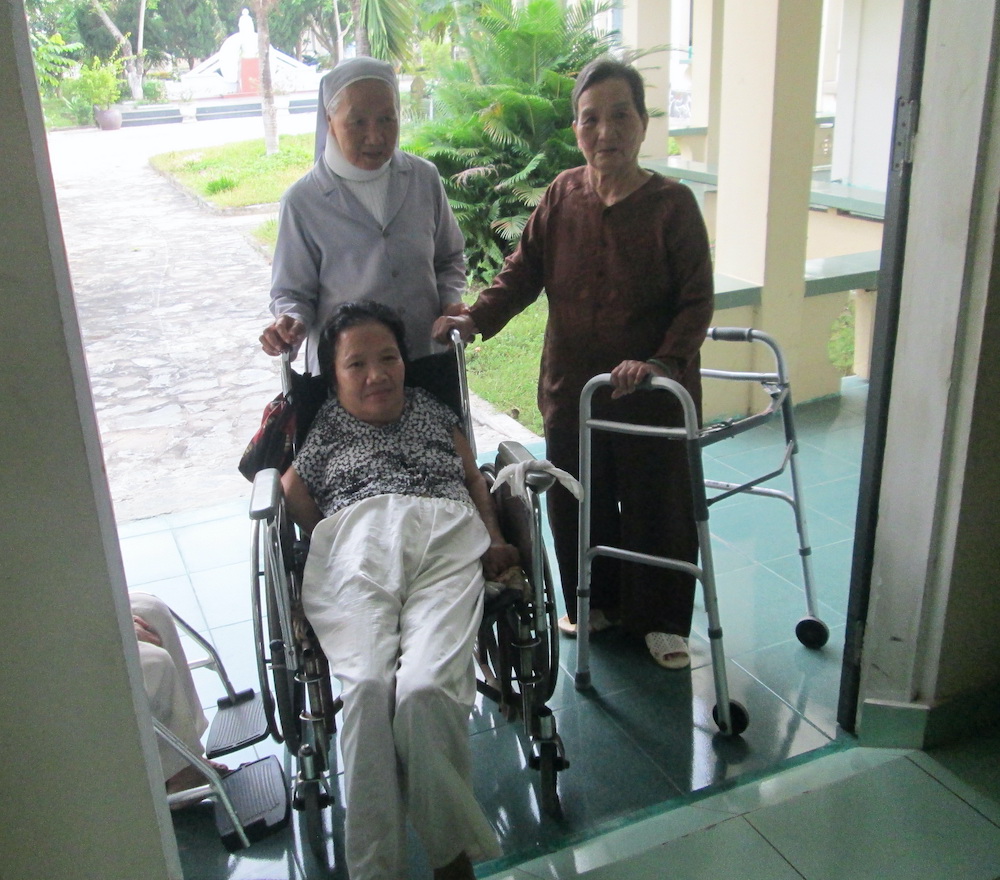
St. Paul de Chartres Sr. Léonard Huynh Thi An, top left, moves an elderly woman in a wheelchair into the chapel at the Elderly Loving Home in Da Nang, Vietnam. (Joachim Pham)
The need to affirm human dignity is also central to the mission of Upendo Street Children, a project run by the Daughters of Charity of St. Vincent de Paul in Kitale, a town in western Kenya about 280 miles from Nairobi, Kenya's capital.
Run by Sr. Winnie Mutuku, the project seeks to restore dignity to children experiencing homelessness, to educate them and reunite them with their families. Mutuku said everyone deserves a home with love and care.
"Many people have never known why others live in the streets. But I wish they could understand that no one chooses to be poor or to live in the streets," Mutuku said. "Whenever I see people living in the streets or being homeless, then I think of God being homeless, because we were created in his own image."
There are no official figures on the number of homeless children in Kenya. However, experts estimate that there could be around 300,000 children living and working on the streets, with more than 60,000 of them in Nairobi.
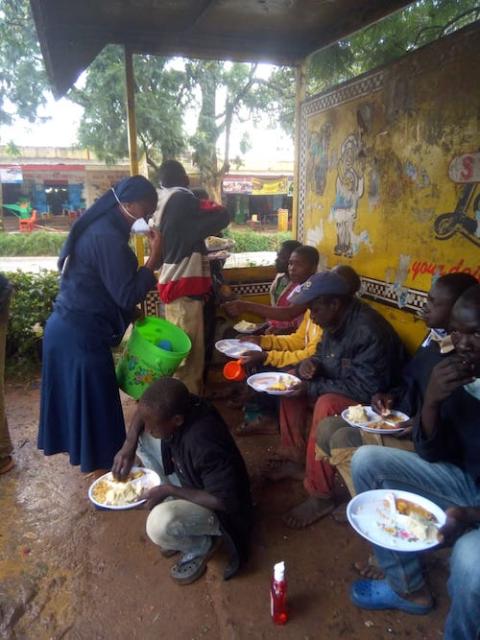
Sr. Winnie Mutuku gives food to the street children in Kitale, a town in western Kenya, amid the COVID-19 pandemic. (Provided photo)
A 2015 Child Rescue Kenya report estimates that there are more than 700 children in the streets of Kitale. Many of them came to the street for a variety of reasons, the most important of which were broken families and poverty.
Mutuku said religious sisters running orphanages and charity centers are advocating for family care as the solution to street homelessness for children.
"Family conflicts and breakups are one of the main factors contributing to street children and homelessness," Mutuku said. "I personally visit families and hold workshops at the church to teach the community about the importance of family."
"Every child deserves a home. At our center, we're trying to reintegrate these children into family rather than keeping them. An orphanage is not the permanent solution to homelessness. But if we teach and empower families, then there will be no children in the streets," she said.
Mutuku added that poverty needs to be addressed, as it is a key factor causing homelessness, though it is not the only one.
"We are teaching women how to make money by opening small businesses. Our center is already planning to collaborate with the guardians of some of the children to build them houses," she said. "If we deal with what causes homelessness, then we won't have homeless people."
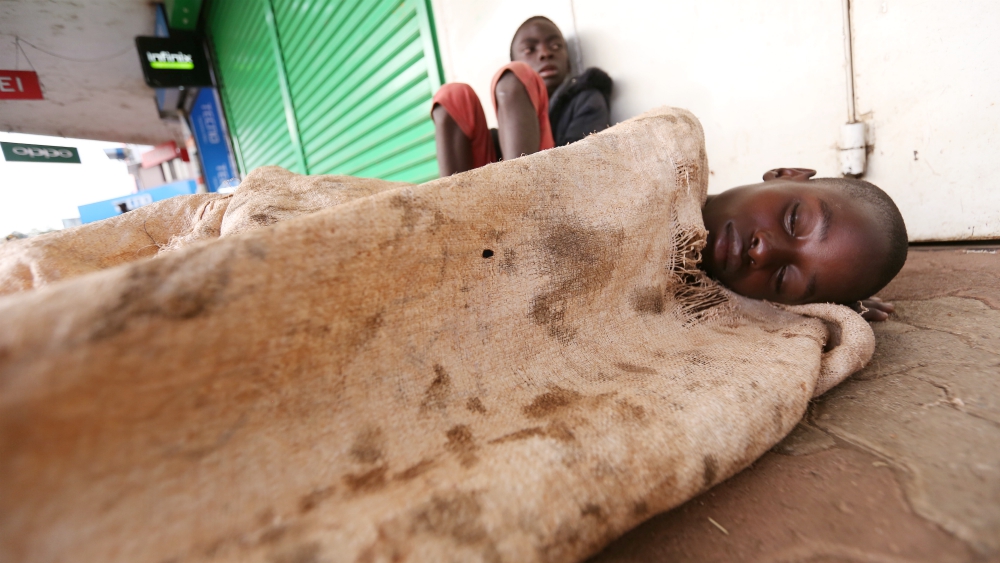
A street child sleeps on a sidewalk in Nairobi, Kenya. There are many socioeconomic factors in families that contribute to the increase of street children in Kenya. These include poverty, lawlessness, alcohol and drug abuse, social permissiveness, family breakup and child abuse. (Doreen Ajiambo)
For women religious, 'the Gospel in action'
The United Nations estimates that 1.6 billion people live in inadequate housing throughout the world. The reasons for their homelessness are complex and varied, as Madden's experience proves.
Madden said she might not have experienced homelessness at all if she "had more family support and [if] my family had a property for me to stay at."
Advocates like Quinn and O'Dwyer say the United Nations and other bodies — governmental and nongovernmental, international, national and local — need to continue to address the structural problems of income inequality and affordable housing.
The U.N. is an appropriate venue for such work, they say, given the U.N.'s ongoing commitment to eliminate world poverty and other social ills by the year 2030 through 17 sustainable development goals.
But it is also important, they say, to continue putting more focus on the issue of homelessness specifically, noting that housing is enshrined as a human right in the United Nations' 1948 Universal Declaration of Human Rights.
The preliminary work at the U.N. this year represents "a small step," said Quinn, but a necessary one. "We have to keep this at the forefront," she said.
Quinn and O'Dwyer said they hope homelessness and housing can be taken up as themes by the U.N.'s General Assembly within the next few years, as the issue is important both to the contemporary world and to the arc of justice.
"It's the Gospel," O'Dwyer said. "It's the Gospel in action."
A homeless family warms by a fire along a road in New Delhi, India, on Nov. 9. (CNS/Reuters/Danish Siddiqui)
[Chris Herlinger is GSR New York and international correspondent. His email address is [email protected]. Staff writers Dan Stockman, Soli Salgado and Doreen Ajiambo contributed to this report, as did freelance writer Joachim Pham in Vietnam.]





